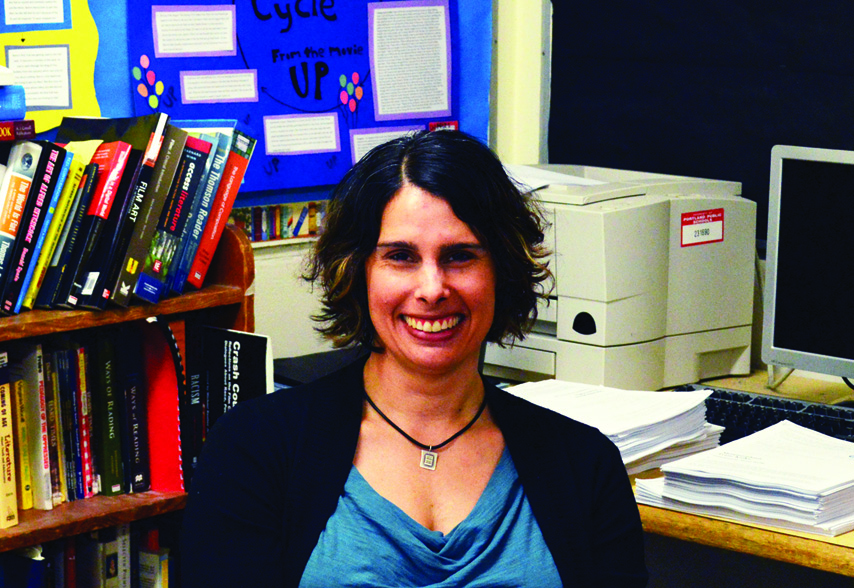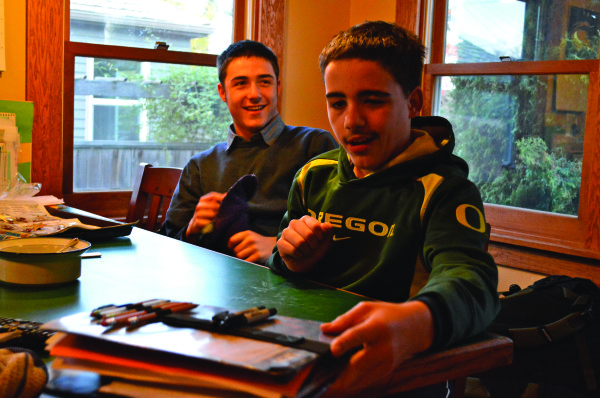
In late October, a woman named Lainie Block Wilker fired off a 15-paragraph e-mail to 550 members of the “Grant Cluster Parents for a Thoughtful High School Redesign” Google group.
Block Wilker’s e-mail decried how Grant High School falls “well below the minimum” for district requirements of advanced course opportunities. “Grant has been slashed to only 7 AP classes – less than any other high school,” she wrote. “College admissions consultants have described Grant’s restrictions on AP classes as ‘jaw-dropping.’”
If these cuts continue, Block Wilker wrote, Grant will see its reputation slide.
Block Wilker’s two children are in third and sixth grade and won’t attend Grant for years. But the e-mail their mother sent out reignited a fierce debate that started two years ago when Principal Vivian Orlen first made changes to course offerings at the school. It’s a debate that encompasses everything from race and socioeconomic standing to how some parents view the Grant community and what the school should do for their children.
On one side is a select group of parents who say they only want the best for their children. Grant, they say, should offer as many challenging courses for their kids as other schools like Lincoln and Cleveland. Parents also condemn the limit on the number of advanced courses students can take.
On the other side stands Orlen, her team of administrators, and the families of children who have struggled in school. While Orlen agrees having an assortment of advanced course offerings is important, she also believes providing opportunities for all students – including those who struggle academically – is just as important.
Orlen says it’s easy for families to focus on the needs of their own children. And as a mother of two boys, she understands that perspective. But as a principal, she doesn’t have that option. “I don’t have the luxury of just being able to look at one child,” Orlen says. “I have to look at a whole spread of them.”
Since she arrived in 2010, Orlen has been aggressive in making changes at the school. She ended the years-long tradition of toga day because some underclassmen didn’t feel safe at school and a number of seniors showed up intoxicated. She closed the campus for freshmen at lunch. And she has confronted teachers who don’t meet the needs of students in the classroom.
Orlen stirred things up even more when she made the move to cut some of the advanced classes in order to make way for more options to help struggling students. Gone were AP classes like Environmental Science, Art History and Psychology. She also limited the number of advanced placement and college-level classes: students can take up to three per year. She reworked some classes, taking away the “advanced” label in order to challenge all students.
Some parents opposed the moves, saying they were unfair to their gifted children. Some students felt the cuts would make it more difficult for them to get into their top-tier colleges. “It’s exhausting to swim against the stream in a regime geared toward equitable mediocrity for all, where academic achievement is considered elitist,” says Block Wilker. “I am passionate about public education, but will not sacrifice my daughters’ education.”
Orlen says she is simply leveling the playing field, especially at a time when school districts have to make do with less money.
Grant’s budgetary woes are not unlike those seen across the country, says Michael Griffith, a senior policy analyst for the Denver-based Education Commission of the States. “Oregon was no different than the rest of the nation,” Griffith says. “When the economy turned south, so did the state’s tax revenue. This forced the state to cut education spending. Most districts have cut everything they can.”
Orlen says despite the cuts, she’s tried to strike a balance between advanced and support classes. When she arrived at Grant, there were 20 advanced classes and no support classes. Now the numbers sit at 16 and four, respectively.
Alanna Dixon, a 16-year-old junior, credits math support classes for greatly improving her skills and confidence. Dixon’s mother, Heidi Cleary, says: “Alanna has been a good student all of her life – getting good grades is very important to her.”
During her sophomore year, Dixon struggled in her second-year algebra class. “It made me feel like I wasn’t really accomplishing much,” she says. “It brought down my self confidence when it came to math and school.”
Things changed after Dixon enrolled in a math support class. She says she was able to learn “key points” that improved her skills and found the extra help she needed to succeed. Her math grade shot up three letters, from a “D” to an “A.”
Sophomore Brandon Redeau, 15, says both reading and math support classes have helped him find his stride. Before enrolling in the reading support class at the start of the year, Redeau was two grade levels behind. “I actually caught up quicker than anybody ever thought I would,” he says. He can now read, write and spell with greater ease and his grade in English went up.
His mother, Tania Redeau, sees the positive impact the support class has had on her son. “I believe that he has finally found a love for reading,” she says.
Brandon Redeau now has higher self-esteem when it comes to assignments. “I wrote an essay for my English class and it was actually the first time that I didn’t need my mom’s help,” he says. “This time I did it all by myself and surprised her. I felt like I had accomplished something finally.”
He’s seen the same thing happen in math. Last year in geometry, Redeau’s grade jumped four letters. This year, he has an “A” in algebra.
Despite success stories like those of Dixon and Redeau, others feel these gains come at the expense of students who shine academically.
Senior Logan Mealy feels “frustrated” by the limitations on advanced classes. He’s a 4.0 student who has taken five AP classes and one Portland State University class at Grant. He says he worked hard to excel in school so by the time his senior year rolled around he could take a heavier load. His intended college major is math or engineering.
This year, Mealy hoped to take PSU probability and statistics and AP calculus. But because Grant students can only take one class per subject area each year, he was limited to taking only calculus.
Mealy, 17, aims to attend the U.S. Air Force Academy. But he don’t have limits on the number of advanced courses they can take.
The academy “would have liked to have seen two AP math classes my senior year. That would have looked a lot better,” says Mealy.
Admissions officers from top colleges say that’s not always the case. Sally Stone Richmond, the dean of admission at Occidental College in Southern California, says a high school’s limits on how many advanced
classes students can take doesn’t set them behind their peers or make them a less competitive candidate.
Since the limitation is not the student’s choice or decision, Richmond says “that would not be fair.”
“We are looking for students to seek a challenging program from existing opportunities at their schools,” Richmond says.
Counselor Liz Mahlum tells her students the same thing: “A prospective student is not penalized for what the school is unable to provide,” she says. “Colleges want to understand if the student took
advantage of what the high school provided them.”
Parents like Diane Mealy, Logan’s mom, are still worried.
She says it seems that since her son is successful, his needs are not a priority. She believes struggling students get more time and attention from faculty, whether they want it or not. “I just think it’s a shame that so much time and energy goes into that population, and I don’t know if there is appreciation or effort on their part to take advantage of those things,” Diane Mealy says. “I want everyone to be successful, but I see what it does to my kids and their situation,” she says. “You can’t force kids to do their homework. You can’t
force kids to go to class. But yet we’re willing to bend over backwards for those kids when we’re holding back the ones who want to excel.”
Some feel even stronger than Mealy, but it was difficult to find current parents to go on the record. Many said they would only speak if they were granted anonymity. As a policy, Grant Magazine does not use anonymous sources in its stories.
Former Grant parent Mary Renken, whose son, Willard, graduated last year, was eager to talk about Grant. She’s not afraid to bring up race in the debate when it comes to academics.
In a response to Block-Wilker’s e-mail, Renken wrote: “I just want to tell you, that I appreciate your fury, and I share it. [When Orlen came to Grant], it was all about those poor little colored children that were being done to by the affluent whites… So far, it’s only N, NE schools that are being, how to say it inoffensively, I don’t know, so I will just say it. Slowed down so minority students won’t be left behind.”
In an interview, Renken elaborated on her stance. “In Portland, everyone who’s white who says they’re not a racist is a racist, so therefore I’m a racist,” she says, adding that people are “looking for it everywhere” to the point where race is a hot topic even when it’s not relevant.
Orlen says Renken’s words don’t merit a response and Renken’s comment speaks for itself. The principal says she won’t apologize for her approach at Grant and she has the backing of Portland Superintendent Carole Smith, who publicly sided with Orlen after Block Wilker’s e-mail was sent.
Orlen responded to the e-mail by sending out a note in the school’s weekly bulletin that addressed the uproar from some families. She explained the need to support all students in the community. She also sent the note to all Grant families. “In this case, concerns were misunderstandings that became widespread misunderstandings, and we were able to clarify those,” Smith says. “Vivian’s e-mail responded very
well with the intent of the district.”
According to Smith, a chief goal of the district is to ensure there is a balance of advanced classes, as well as support classes at each school.
Says Smith: “Grant has done really well at meeting that expectation” despite crippling budget cuts.
Orlen says she thinks the way Block Wilker chose to broadcast her concerns was “somewhat destructive for our community. I think when people chose that forum to send out misinformation, it doesn’t do service to building community. People can agree to disagree, but I think that the way she did it was somewhat destructive.”
Meanwhile, national education experts say parents and students shouldn’t get caught up in the idea that AP classes mean smarter students. Joseph McDonald, a professor of teaching and learning at the Steinhardt School of Culture, Education, and Human Development at New York University, has written seven books on the role of teaching and school reform.
“There’s some concern over the intellectual quality of some courses called AP,” he says. “In any high
school, the first thing I would suggest is: don’t think a class called AP is more intellectually rigorous than a course called a support class.”
Diane Mealy doesn’t buy it. She has two other sons: 14-year-old Morgan, a freshman at Grant, and 12-year-old Kevin, a sixth-grader at Beaumont Middle School. “I’d like to think we’re going to have
opportunities for them when they get to Grant,” she says. “It feels like we should be able to get our money’s worth out of public schools.”
For Dixon, the junior who struggled in math, the attention from support classes has opened up new doors. After seeing Dixon’s success, her teacher asked her to help tutor other struggling students. Initially, Dixon was hesitant. But she remembered how helpful it was to have a tutor her own age to whom she could relate.
She now spends fifth period helping students find success like she did. “Kids who need help should be able to have higher standards for themselves and more opportunities,” she says.
Tania Redeau is glad her son, Brandon, got the help he needed. She credits Orlen with making her son’s academic experience worthwhile.
“I appreciate Principal Orlen’s willingness to try whatever it takes for students to be successful,” Redeau says. “Not all students learn at the same pace, so sometimes the extra support is needed.” ♦



